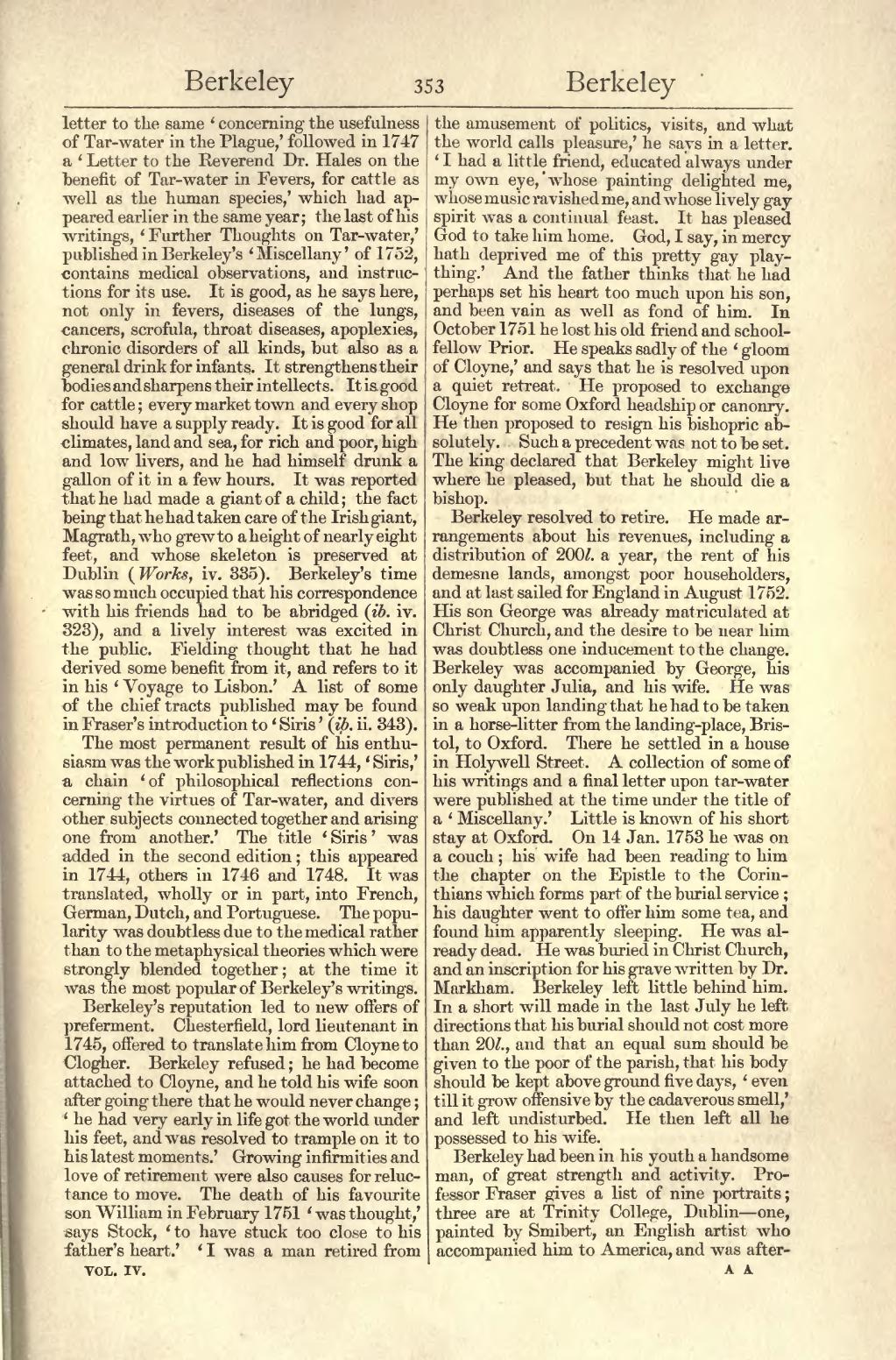letter to the same 'concerning the usefulness of Tar-water in the Plague,' followed in 1747 a 'Letter to the Reverend Dr. Hales on the benefit of Tar-water in Fevers, for cattle as well as the human species,' which had appeared earlier in the same year; the last of his writings, 'Further Thoughts on Tar-water,' published in Berkeley's ' Miscellany ' of 1752, contains medical observations, and instructions for its use. It is good, as he says here, not only in fevers, diseases of the lungs, cancers, scrofula, throat diseases, apoplexies, chronic disorders of all kinds, but also as a general drink for infants. It strengthens their bodies and sharpens their intellects. It is good for cattle; every market town and every shop should have a supply ready. It is good for all climates, land and sea, for rich and poor, high and low livers, and he had himself drunk a gallon of it in a few hours. It was reported that he had made a giant of a child; the fact being that he had taken care of the Irish giant, Magrath, who grew to a height of nearly eight feet, and whose skeleton is preserved at Dublin (Work, iv. 335). Berkeley's time was so much occupied that his correspondence with his friends had to be abridged (ib. iv. 323), and a lively interest was excited in the public. Fielding thought that he had derived some benefit from it, and refers to it in his 'Voyage to Lisbon.' A list of some of the chief tracts published may be found in Fraser's introduction to 'Siris' {ib. ii. 343).
The most permanent result of his enthusiasm was the work published in 1744, 'Siris,' a chain 'of philosophical reflections concerning the virtues of Tar-water, and divers other subjects connected together and arising one from another.' The title 'Siris' was added in the second edition; this appeared in 1744, others in 1746 and 1748. It was translated, wholly or in part, into French, German, Dutch, and Portuguese. The popularity was doubtless due to the medical rather than to the metaphysical theories which were strongly blended together; at the time it was the most popular of Berkeley's writings.
Berkeley's reputation led to new offers of preferment. Chesterfield, lord lieutenant in 1746, offered to translate him from Cloyne to Clogher. Berkeley refused; he had become attached to Cloyne, and he told his wife soon after going there that he would never change; 'he had very early in life got the world under his feet, and was resolved to trample on it to his latest moments.' Growing infirmities and love of retirement were also causes for reluctance to move. The death of his favourite son William in February 1751 'was thought,' says Stock, 'to have stuck too close to his father's heart.' 'I was a man retired from the amusement of politics, visits, and what the world calls pleasure,' he says in a letter. 'I had a little friend, educated always under mv own eye, whose painting delighted me, whose music ravished me, and whose lively gay spirit was a continual feast. It has pleaded God to take him home. God, I say, in mercy hath deprived me of this pretty gay plaything.' And the father thinks that he had perhaps set his heart too much upon his son, and been vain as well as fond of him. In October 1751 he lost his old friend and school-fellow Prior. He speaks sadly of the 'gloom of Cloyne,' and says that he is resolved upon a quiet retreat. He proposed to exchange Cloyne for some Oxford headship or canonry. He then proposed to resign his bishopric absolutely. Such a precedent was not to be set. The king declared that Berkeley might live where he pleased, but that he should die a bishop.
Berkeley resolved to retire. He made arrangements about his revenues, including a distribution of 200l. a year, the rent of his demesne lands, amongst poor householders, and at last sailed for England in August 1752. His son George was already matriculated at Christ Church, and the desire to be near him was doubtless one inducement to the change. Berkeley was accompanied by George, his only daughter Julia, and his wife. He was so weak upon landing that he had to be taken in a horse-litter from the landing-place, Bristol, to Oxford. There he settled in a house in Holywell Street. A collection of some of his writings and a final letter upon tar-water were published at the time under the title of a 'Miscellany.' Little is known of his short stay at Oxford. On 14 Jan. 1753 he was on a couch; his wife had been reading to him the chapter on the Epistle to the Corinthians which forms part of the burial service; his daughter went to offer him some tea, and found him apparently sleeping. He was already dead. He was buried in Christ Church, and an inscription for his grave written by Dr. Markham. Berkeley left little behind him. In a short will made in the last July he left directions that his burial should not cost more than 20l., and that an equal sum should be given to the poor of the parish, that his body should be kept above ground five days, 'even till it grow offensive by the cadaverous smell,' and left undisturbed. He then left all he possessed to his wife.
Berkeley had been in his youth a handsome man, of great strength and activity. Professor Fraser gives a list of nine portraits; three are at Trinity College, Dublin — one, painted by Smibert, an English artist who accompanied him to America, and was after-
